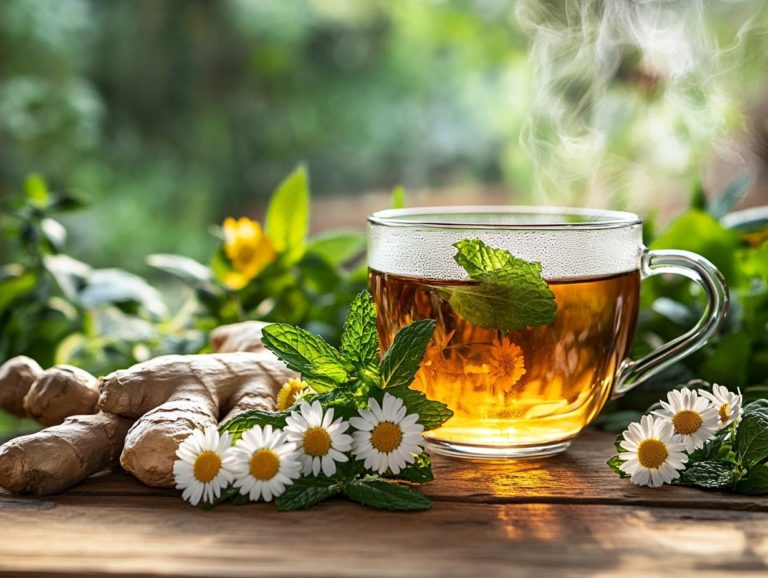Are There Ethical Considerations in Herbal Medicine?
Herbal medicine, a versatile field of practice that encompasses ethical frameworks and traditional medicine, has long served as a cornerstone of traditional healing practices, rich in history and cultural significance.
As its popularity flourishes in today s world, ethical challenges arise as healthcare globally begins to integrate these practices. Questions regarding its ethical implications naturally arise, particularly when analyzing the importance of doing no harm and respecting patient choices. This exploration delves into the definition and historical context of herbal medicine, while also examining the intricate relationship between traditional remedies and contemporary medical practices, including both pharmacological effects and the challenges they present to healthcare professionals.
Join us for a thoughtful examination of the ethical responsibilities surrounding transparency, informed consent, and respect for traditional knowledge. We will consider the impact on local communities, particularly in understanding their reliance on complementary treatment and plant-based medicines. Additionally, we will discuss the importance of safety in herbal medicine. Engage with us as we navigate these vital discussions.
Contents
- Key Takeaways:
- Overview of Herbal Medicine
- Ethical Considerations in Herbal Medicine
- Cultural and Social Implications
- Personal and Professional Ethics
- Frequently Asked Questions
- Are There Ethical Considerations in Herbal Medicine?
- What ethical issues might arise in herbal and traditional medicine?
- How can we address the sustainability of herbal resources?
- How can we ensure the safety and effectiveness of herbal remedies?
- What is the risk of exploiting traditional knowledge in herbal medicine?
- How can practitioners maintain ethical standards in herbal medicine?
Key Takeaways:

- Herbal medicine has a long history and definition that distinguishes it from modern medicine, making ethical considerations unique and important.
- Regulations and quality control are necessary to ensure the safety and efficacy of herbal medicines, but can also create conflicts with traditional practices.
- Practitioners and consumers of herbal medicine must consider the cultural and social implications, including respecting traditional knowledge and its impact on local communities.
Overview of Herbal Medicine
Herbal medicine, a cornerstone of traditional healing methods, invites you into a world where plant-based remedies have been cherished for centuries across diverse cultures. The World Health Organization acknowledges its profound importance, particularly in regions such as Asia and Africa, where traditional practices like Traditional Chinese Medicine and Ayurvedic medicine flourish.
Embracing herbal medicine allows you to appreciate a holistic approach to healthcare, emphasizing natural remedies and the rich tapestry of cultural customs that accompany them.
Definition and History
Herbal medicine is the art of harnessing medicinal plants for therapeutic purposes, deeply rooted in the traditions of diverse cultures throughout history.
This esteemed practice weaves together a rich tapestry of knowledge, showcasing how various civilizations have turned to the natural world for healing, guided by their unique beliefs and rituals. Take Chinese medicine, for instance; ginseng has long been hailed for its rejuvenating properties. Meanwhile, in Ayurvedic traditions, turmeric shines as a celebrated powerhouse for its anti-inflammatory benefits.
Across a multitude of pharmacopoeias, herbal remedies have been meticulously documented, offering a wealth of insights into their applications and methods of preparation. These texts act as a bridge, connecting ancient wisdom to modern medicine and underscoring the enduring relevance of plant-based therapies in today s healthcare landscape.
Ethical Considerations in Herbal Medicine
The ethical considerations surrounding herbal medicine are becoming increasingly vital as the global healthcare landscape grapples with integrating traditional practices into modern medical frameworks. This integration raises important questions about the ethical standards maintained by herbal practitioners, making it essential for you to remain informed and discerning in this evolving field.
Conflicts with Modern Medicine

Conflicts often arise between herbal medicine and modern medicine due to their different philosophies. This is especially true regarding the pharmacological effects of traditional treatments.
For instance, healthcare professionals worry when patients use herbal supplements like St. John’s Wort alongside antidepressants. This herb can lessen the effectiveness of antidepressants known as selective serotonin reuptake inhibitors (SSRIs).
If you’re considering garlic supplements with blood thinner treatments, be cautious. Garlic can enhance the effects of blood thinners like warfarin, which can pose risks.
Such cases highlight the complexities in patient care when people choose complementary therapies. Experts emphasize open communication with your healthcare providers to ensure safety and optimize treatment plans.
Regulation and Quality Control
The regulation of herbal medicine is essential for ensuring quality control and safety. This is particularly crucial in resource-limited areas where access to complementary treatments can be scarce. In these regions, where traditional practices often take precedence, establishing rigorous guidelines is vital.
Without adequate oversight, risks like contamination, mislabeling, and ineffective formulations can escalate and jeopardize consumers.
It’s vital to integrate ethical considerations into these frameworks, addressing issues of exploitation and misinformation. By implementing comprehensive quality control measures, you can enhance the efficacy of herbal products and build consumer trust.
Navigating these challenges requires innovative strategies and collaboration among regulatory bodies, healthcare providers, and local communities. This approach fosters a more secure and ethical marketplace for herbal medicine.
Cultural and Social Implications
The cultural and social implications of herbal medicine extend beyond therapeutic advantages. They intertwine deeply with the cultural significance of these practices and the respect accorded to traditional knowledge within local communities.
Respect for Traditional Knowledge
Respecting traditional knowledge is vital for preserving the cultural customs linked to herbal practitioners and their specific medicinal plants.
This wisdom is often shared through storytelling, hands-on training, and community rituals. These practices ensure that you inherit not only the techniques but also a deep appreciation for the natural world.
Herbal practitioners are central to this journey, acting as custodians of ancient practices while adapting to contemporary needs. Their unique relationships with medicinal plants involve a profound understanding of the plants’ properties, optimal harvest times, and preparation methods.
By maintaining these connections, we help ensure that the invaluable benefits of herbal medicine are honored and continue to flourish for generations to come.
Impact on Local Communities

The impact of herbal medicine on local communities is nothing short of profound, shaping global healthcare while reinforcing cultural significance and community identity.
In many regions, particularly in Southeast Asia and parts of Africa, local populations heavily rely on herbal treatments for their primary healthcare needs. This reliance not only enhances access to affordable healthcare options especially in remote or underserved areas but also fosters the preservation of traditional practices and knowledge.
Take, for instance, the indigenous tribes of the Amazon rainforest, who utilize a treasure trove of botanical remedies passed down through generations, serving both medicinal and ritualistic purposes.
However, the growing commercialization of these resources brings challenges. It often leads to overharvesting and the erosion of invaluable cultural heritage. We must act now to protect these invaluable resources!
It’s crucial to strike a balance between these positive and negative effects to ensure sustainable practices that honor both community health and cultural integrity.
Personal and Professional Ethics
Personal and professional ethics are paramount in the realm of herbal medicine, highlighting the importance of transparency, informed consent, and careful navigation of potential conflicts of interest.
It is essential to cultivate an ethical foundation that not only guides your practice but also fosters trust and integrity in your relationships with clients.
Transparency and Informed Consent
Transparency and informed consent are paramount ethical principles in herbal medicine, ensuring you are fully aware of the treatments you receive.
This level of openness not only demystifies the therapeutic process but also gives you the power to make informed decisions about your health. When practitioners provide clear information about the ingredients, potential effects, and any associated risks of herbal treatments, it cultivates a sense of security and confidence in your relationship with them.
Building that trust is essential. It encourages you to voice your concerns and ask questions, ultimately leading to better health outcomes. An informed patient, like yourself, feels more engaged in their care, which is vital for fostering a collaborative and effective therapeutic partnership.
Conflict of Interest
Conflicts of interest present serious ethical issues for healthcare professionals engaged in herbal medicine. These issues potentially jeopardize the integrity of ethical standards within an ethical framework.
These conflicts often emerge when practitioners place personal gain above patient welfare, promoting particular products or treatments that serve their financial interests instead of addressing the health needs of those they serve. This misalignment can erode trust between you and your patients.
To handle these challenges well, herbal practitioners must prioritize transparency and open communication with patients. By clearly outlining any potential biases and actively seeking collaborative solutions that align with patient interests, you can cultivate an environment of ethical integrity and accountability.
In doing so, you not only enhance the quality of care but also fortify the trust within your professional relationships.
Frequently Asked Questions

Are There Ethical Considerations in Herbal Medicine?
Yes, there are ethical considerations in herbal medicine. This is because the use of herbal remedies can potentially have both positive and negative effects on individuals and the environment.
What ethical issues might arise in herbal and traditional medicine?
Some potential ethical issues in herbal medicine include the sustainability of herbal resources, the safety and efficacy of herbal remedies including their pharmacological effects and the potential for exploitation of traditional knowledge and practices by pharmaceutical companies.
We encourage you to share your thoughts on herbal medicine with us!
How can we address the sustainability of herbal resources?
Sustainable harvesting methods protect the environment. We can also promote the cultivation of medicinal herbs and support local communities dependent on herbal medicine.
How can we ensure the safety and effectiveness of herbal remedies?
Ensuring the safety and effectiveness of herbal remedies requires thorough research and clinical studies. Herbal practitioners must understand the herbs they use and how they interact with other medications.
What is the risk of exploiting traditional knowledge in herbal medicine?
We must act quickly to protect traditional knowledge from exploitation! Pharmaceutical companies might use this knowledge to create synthetic remedies without acknowledging the communities that shared it.
How can practitioners maintain ethical standards in herbal medicine?
Practitioners should promote informed consent and transparency in their practices. They must also respect cultural beliefs in herbal medicine, especially those in Traditional Chinese Medicine and Ayurvedic practices.






